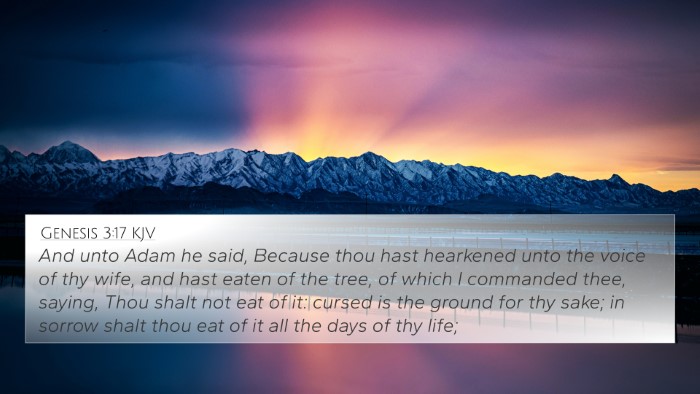Psalms 127:2 - Explanation and Meaning
Bible Verse: Psalms 127:2 (KJV) - "It is vain for you to rise up early, to sit up late, to eat the bread of sorrows: for so he giveth his beloved sleep."
This verse from Psalms emphasizes the futility of excessive toil and anxiety in the pursuit of success and provision. The teaching here is that true rest and provision come from the Lord, and not merely through human effort.
Insights from Commentaries
- Matthew Henry's Commentary:
Henry notes that the verse addresses those who labor excessively, suggesting that such hard work without reliance on divine providence is ultimately in vain. He emphasizes the need for balance in life, where reliance on God brings peace and rest.
- Albert Barnes' Commentary:
Barnes highlights that the term "vain" indicates an action that is futile if it lacks divine blessing. He elaborates on the "bread of sorrows" as a metaphor for the painful results of anxiety and relentless striving apart from God. He encourages readers to trust in God’s provision and timing.
- Adam Clarke's Commentary:
Clarke emphasizes that while diligence in work is necessary, one must recognize that true success is granted by God. He discusses the contrast between worry and the peace that God provides to those He loves, thereby encouraging reliance on divine support rather than endless labor.
Key Themes
The primary themes in this verse include:
- Divine Providence: Trusting that God provides what is necessary.
- The Futility of Anxiety: Understanding that worry does not contribute to one's ability to succeed or provide.
- The Gift of Rest: Recognizing that God grants peace and sleep to those He loves.
Cross-References
This verse is closely linked to several other scriptural references, demonstrating thematic connections across the Bible:
- Proverbs 10:22: "The blessing of the Lord, it maketh rich, and he addeth no sorrow with it." - This verse reiterates the idea that God's blessings are given without the burden of anxiety.
- Matthew 6:25-34: Jesus teaches about not worrying for material needs, indicating that God knows your needs and will provide for you.
- 1 Peter 5:7: "Casting all your care upon him; for he careth for you." - This passage underscores the importance of transferring our anxieties to God.
- Psalm 46:10: "Be still, and know that I am God." - A reminder to find peace in God's sovereignty.
- Jeremiah 29:11: God has plans for us, reassuring that He knows the future and intends for our well-being.
- Philippians 4:6-7: Encourages believers not to be anxious but to bring their requests to God, resulting in peace that guards the heart.
- Matthew 11:28-30: Jesus invites the weary to find rest in Him; a call to rely on His strength and care.
- Ecclesiastes 2:23: Highlights the stress and sorrow resulting from labor undertaken without God’s blessing.
- Isaiah 30:15: "In repentance and rest is your salvation, in quietness and trust is your strength." - Emphasizes the strength found in reliance on God as opposed to anxiety.
- Romans 15:13: "Now the God of hope fill you with all joy and peace in believing..." - A reminder that trusting in God brings joy and peace.
Importance of Cross-Referencing
Utilizing cross-references enhances the understanding of biblical texts by revealing deeper layers of meaning and connections between different passages. Cross-referencing can create a better grasp of theological concepts, help in sermon preparation, and provide a framework for personal study and devotion.
Tools and Methods for Cross-Referencing
There are many tools for Bible cross-referencing available:
- Bible concordances are essential for quickly locating related scriptures.
- Cross-referring with a study Bible can provide immediate links to other pertinent verses.
- Online resources and Bible apps often have built-in cross-reference guides.
- A systematic approach such as thematic studies can reveal connections not immediately visible.
- How to use Bible cross-references effectively: Practice by examining familiar passages and branching out to related verses.
Conclusion
Psalms 127:2 serves as a profound reminder of the need to balance work and trust in God's provision. By integrating insights from renowned commentaries and related scriptures, we can gain a more comprehensive understanding of its message. Emphasizing the importance of cross-referencing can deepen our biblical literacy and enrich our spiritual lives.


















